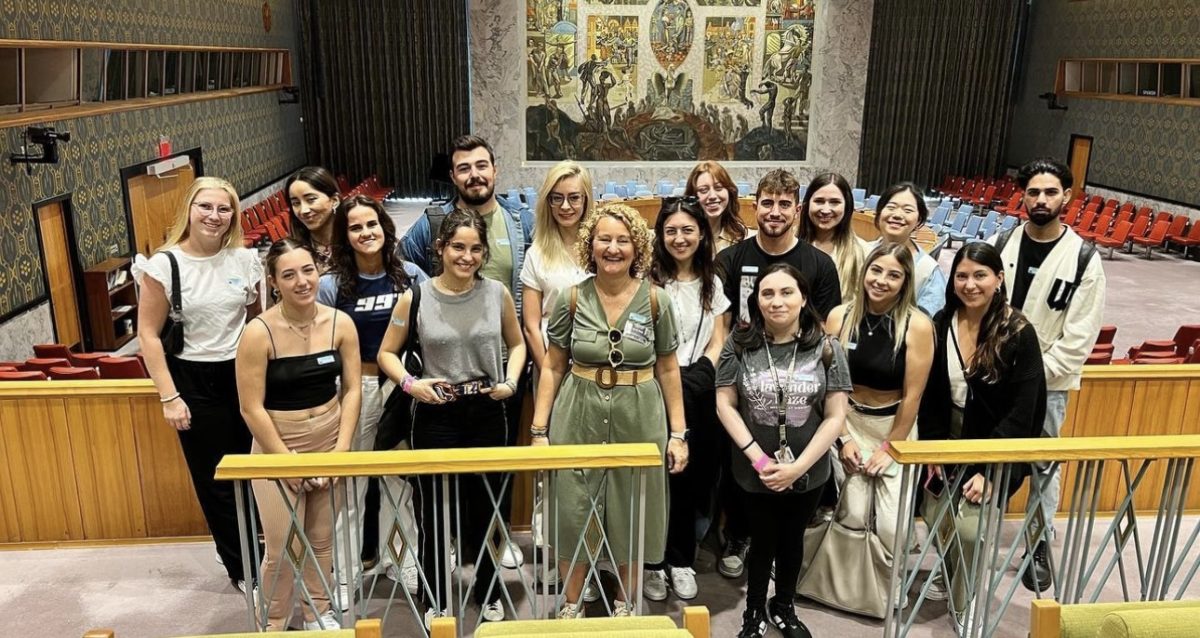Mercy University boasts a diverse student body hailing from 60 different countries, primarily from Europe and Latin America. There is significant representation from countries like Norway, Bangladesh, India, and Spain. The Manhattan campus mainly attracts those who seek the vibrant heart of New York City.
Isabela Hernandez, a 21-year-old Chilean native, embarked on her academic journey at Mercy University in the midst of the tumultuous year 2020.
Choosing Mercy
Hernandez’s journey to Mercy University began with the Education First (EF) Cultural Exchange Program, which specializes in language training, educational travel, academic degree programs, and cultural exchange. When discussing her educational options, Hernandez’s EF counselor introduced her to Mercy University. She chose Mercy due to its open-minded approach, which contrasted with the conservative atmosphere in some other institutions. This decision was driven by her passion for music production, which Mercy offered.
Hernandez said, “In the end, while talking to my counselor at EF about where I should go, she showed me the option of Mercy because it had my major, which is music production, and most of the others I looked at had a conservative approach, and I wanted a neutral one, so I decided Mercy.”
Learning English and Financial Challenges
Hernandez’s path to fluency in English was unconventional. She became self-taught, mastering the language through video games, YouTube, and Netflix. Her proficiency enabled her to pursue her dreams of studying in New York, a lifelong aspiration.
She said, “My parents tried to put me in a bilingual school, but my English was already way better than the class I was supposed to be in.”
While adapting to the United States, Hernandez encountered significant hurdles. The steep tuition fees for international students were a financial burden. Hernandez was fortunate to have her mother’s financial support, a luxury that not all Latin American students enjoy.
As an international student, Hernandez’s employment options were limited to work-study jobs, which further heightened her financial concerns. The contrast in tuition fees between international and U.S. American students was stark. International students’ tuition at Mercy University is $37,158, while U.S. American students pay $22,106 without a scholarship. However, her position as a Residential Assistant (RA) mitigated these expenses.
Hernandez reflected, “I was lucky enough to have a hard-working mother. She told me she had saved money for me after I finished college, and she, later on, gave me the option to either use it for going to study abroad or use it later on to have commodity.”
Social Integration
Hernandez admitted that making friends at Mercy presented a challenge, particularly for international students like herself. Most students arrive fresh out of high school and are eager to form friendships. For Hernandez, who was more experienced and self-reliant, it was not as easy to connect with her peers. Her characteristics as an international student made fitting in a unique challenge.
Hernandez shared, “The people who come here normally are 17 to 18 years old, coming out of school, and coming to make friends. For me, it’s hard to fit in. I had nice roommates, but they already had their friendships established.”
Critique of the U.S. Educational System
Hernandez had some reservations about her academic experience in the United States. She feels the curriculum should be more challenging as she was limited by less advanced classmates. Hernandez remarked that the U.S. education system’s failure to impart cultural knowledge is disconcerting, as she encountered individuals with limited global awareness.
She said, “They don’t take advantage of the many resources they have here. They don’t realize it.” She added, “I sometimes felt an indirect discrimination, not because they are being openly discriminated towards me, but because the lack of certain knowledge about my country, and about just basic world events, offends me.”
The Importance of Empathy
Hernandez believed that empathy was essential for fostering better relations between international and American students. She observed that a lack of understanding about other cultures perpetuates stereotypes and a sense of exclusion. She hoped that a more profound cultural exchange could break these barriers.
Hernandez concluded, “I came here to be more free and accepted.” She added, “Being here has made me find my true self, but I have had many difficulties. I feel for my people with the current migration crisis going on. I feel people sometimes are different because of the current issues that my people are facing.”
A Growing International Community
Bogdana Vladescu, Senior Director and PDSO of Mercy International Student Services, revealed a rising trend in international student enrollment. As a designated school official for Homeland Security, she addressed misconceptions about studying abroad and encouraged international students to explore available opportunities.
Vladescu highlighted the potential for international students to study abroad and said, “It doesn’t impact your I-20 or your visa. The tuition is the same, it is paid through Mercy, many international students love it, and now I’m trying to motivate internationals to do a year abroad.”
Bogdana enthusiastically encourages international students to join the International Student Club, providing a platform for them to voice their needs and concerns. It’s an opportunity to foster unity and advocate for their rights.
For more information on studying abroad or joining the International Student Club, please contact Vladescu at [email protected].










